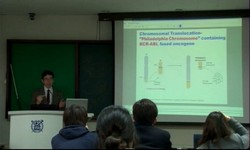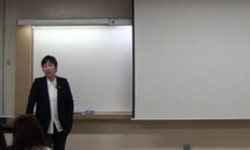To a better understanding for molecular mechanism of oncogenesis in hepatoma, primary hepatocellular carcinoma and hepatoma cell lines(Hep 3B, PLC/PRF/5, Hep G2) were subjected to detailed cytogenetic analysis with G-banding method after cell cultures...
http://chineseinput.net/에서 pinyin(병음)방식으로 중국어를 변환할 수 있습니다.
변환된 중국어를 복사하여 사용하시면 됩니다.
- 中文 을 입력하시려면 zhongwen을 입력하시고 space를누르시면됩니다.
- 北京 을 입력하시려면 beijing을 입력하시고 space를 누르시면 됩니다.

B형 간염 virus 양성 간암과 음성 간암의 세표유전학적 차이 = Cytogenetic differences between hepatitis B posotive and negative in hepatoma
한글로보기https://www.riss.kr/link?id=A2025926
- 저자
- 발행기관
- 학술지명
- 권호사항
-
발행연도
1993
-
작성언어
Korean
- 주제어
-
KDC
510.5
-
등재정보
KCI등재후보
-
자료형태
학술저널
-
수록면
473-482(10쪽)
- 제공처
- 소장기관
-
0
상세조회 -
0
다운로드
부가정보
다국어 초록 (Multilingual Abstract)
Regions of chromosome abnormalities in PLC / PRF / 5 were the same found in Hep 3B. Besides, del(1q32) and del(1p32) were also cloned. Gene of CRl and MYCLl were located on 1q32 and 1p32 respectively. The characteristic findings of chromosome abnormalities in Hep G2 were del(1p31) and del (1q22). And GSTl and DAF were located on these regions each other. Del(6q11) and del(1p22) were
also found in Hep G2. From the above results, it is presumed that HBV may integrate to AMYlA gene or near this gene and leads to ioss of functions to this gene. And impaired regulation of CGA occurs in next step. SEA, HSTFl and MYCLl oncogenes may act as a progressing factor of tumourgenesis in HBsAg(+) hepatoma, Some factors like chemical agents may cause functional loss of GSTl and DAF at first and functional loss of cell regulation of CGA occurs in next step. SKI oncogene may promote the progression of carinogenesis in this cell line. Whether any causative agents are involed in carcinogenesis of hepatoma, fuctional loss of CGA gene is the most important factor in tumour-genesis
in hepatoma.
To a better understanding for molecular mechanism of oncogenesis in hepatoma, primary hepatocellular carcinoma and hepatoma cell lines(Hep 3B, PLC/PRF/5, Hep G2) were subjected to detailed cytogenetic analysis with G-banding method after cell cultures. No cloned chromosomal abnormalities were found in the primary hepatoma(below 10%). On the other hand, all hepatoma cell lines were cloned, the specific chromosomal abnormalities in Hep 3B were del(1p21), del(6q14) and t(1 : 11) (p11 : q13). Gen of AMYLA, CGA, SEA and HSTFl were located on 1p21 and 6q14 respectively. SEA and HSTFl were located on 11q13.
Regions of chromosome abnormalities in PLC / PRF / 5 were the same found in Hep 3B. Besides, del(1q32) and del(1p32) were also cloned. Gene of CRl and MYCLl were located on 1q32 and 1p32 respectively. The characteristic findings of chromosome abnormalities in Hep G2 were del(1p31) and del (1q22). And GSTl and DAF were located on these regions each other. Del(6q11) and del(1p22) were
also found in Hep G2. From the above results, it is presumed that HBV may integrate to AMYlA gene or near this gene and leads to ioss of functions to this gene. And impaired regulation of CGA occurs in next step. SEA, HSTFl and MYCLl oncogenes may act as a progressing factor of tumourgenesis in HBsAg(+) hepatoma, Some factors like chemical agents may cause functional loss of GSTl and DAF at first and functional loss of cell regulation of CGA occurs in next step. SKI oncogene may promote the progression of carinogenesis in this cell line. Whether any causative agents are involed in carcinogenesis of hepatoma, fuctional loss of CGA gene is the most important factor in tumour-genesis
in hepatoma.
동일학술지(권/호) 다른 논문
-
- 啓明大學校 醫科大學
- 김명성
- 1993
- KCI등재후보
-
- 啓明大學校 醫科大學
- 이정형
- 1993
- KCI등재후보
-
- 啓明大學校 醫科大學
- 김재룡
- 1993
- KCI등재후보
-
Clomiphene Citrate와 Human Menopausal Gonadotropin에 의한 배란 유도후의 임심율
- 啓明大學校 醫科大學
- 남동호
- 1993
- KCI등재후보




 RISS
RISS







